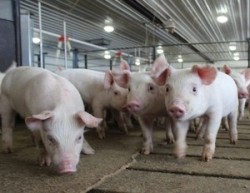SPECIAL EDITION: EARLY ANIMAL NUTRITION
Supplements for weight gain and gut function: Researchers seek deeper additive understanding

The company has produced several supplements based on fermented Saccharomyces cerevisiae or strains of fermented bacteria like Lactobacillus acidophilus that have been used to help young pigs grow faster and improve weight gain, said Jason Frank, director of non-ruminant research and technical support at Diamond V. But, more work needs to be done to understand exactly how and why the products create the effects they do.
“We’re trying to explore why if we feed (a supplement) we see more pigs weaned and more weaning weight in those pigs, (because) we’ve seen that response in about half a dozen research studies,” he said. “For our own interest and our customers’ interest, we’d like to understand more about the why.”
Research
A current research project presented by the company at the Digestive Physiology of Pigs symposium in Poland, looked at multiple nutritional boosters and what parts of the digestive system they support, especially when the young pig is facing heat stress, said Frank.
The project included supplements offered by Diamond V along with an antibiotic mix and was done in conjunction with the US Department of Agriculture, he added.
“They had expertise in looking at alternatives to antibiotics, as those components are more heavily regulated, we’re trying to find products that can (improve) health and to try to get a more fundamental understanding of how our products effect immune function and antimicrobial activity,” said Frank.
“We selected heat stress as the challenge because it’s a very real issue on a global swine production basis where it affects performance and it can disrupt gut integrity,” he added.
In previous use of the products, researchers had documented improved weight gain and feed intake during the nursery phase, he said, along with piglets needing fewer health treatments. But, the new research sought to better understand what promoted those results.
Throughout the 35-day trial, 96 pigs were given one of three supplements, a Saccharomyces cerevisiae fermentation product, a Lactobacillus acidophilus fermentation product or an antibiotic mixture, while a fourth group received no supplement.
Pigs were kept at about a 77 degree F temperature then stressed with five hour periods of about 104 degree F temperatures for the final seven days of the trial.
In the study, researchers found the largest amounts of fecal E. coli after the seven days of heat stress in the pigs getting the antibiotic mixture, they reported. However, the pigs receiving the Saccharomyces cerevisiae product had spikes in fecal IgA and natural killer cell activity after heat stress and those getting the lactobacillus supplement had increased butyrate and villus height:crypt depth ratio.
“(We) want to see a higher villus height as that’s associated with better health,” said Frank. “It’s really interesting because it correlates with the fecal butyrate response, and those two measurements tie together very well because butyrate is known to provide benefit to gut health.” The natural killer cells are a part of the pig’s immune system, he added.
Immunity and the gut
In swine, the current research includes seeking methods of improving the health of sows to boost litter health and weaning weight, said Frank. It carries through keeping the young pigs healthy after the stress of weaning and training the immune system.
“We’re starting to understand why the bacteria in the gut in the young pig can educate or train the immune system, we can call it an appropriately responding immune system in the animal,” he said. “If we can teach it early enough in the life cycle (about) what’s good from bad, it will be a more appropriately responding immune system.”
The focus with much of the work has been on young pigs because they are in a state of growth and change, and the period establishes the pig for later production, he said. Additionally, about 70% of the immune cells for the young animal are in the gut, so the diet and intestinal tract may have a large influence on the pig’s health.
“What we’ve learned so far is we know we’re shifting the microbial population in the digestive track in these pigs, enhancing what we’d classify as beneficial bacteria and we see better performance in the pigs,” he said. “While it’s not specifically cause and effect – we know those two items are pretty well correlated and if we’re improving beneficial bacteria in the gut, those animals are more productive, we’re confirming that – and we’ll continue to look more specifically in this area.”
Areas for more focus
Although there is an understanding that systems within a pig’s body interact with each other, more work needs to be done to understand that interaction, added Benjamin Bass, swine researcher and technical support at Diamond V.
“We’re providing the animal with different feeds and compounds but not necessarily knowing how they’re affecting the animal,” he said. “We’ve focused a lot on the nutrient value, but not necessarily given enough thought to how it’s influencing the immune system and the bacterial population that’s there – is it a good impact or a bad impact? Do we know? It’s a retraining of how we’re approaching feeding animals and a different mindset.”
Additionally, the company is seeking to expand its market for supplements, said Frank. Although it has been focused on the North American market, it is in the process of expanding sales internationally.














